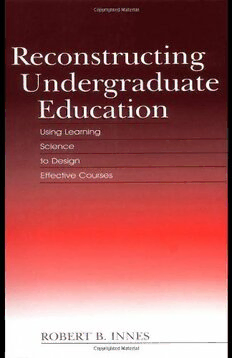
Reconstructing Undergraduate Education: Using Learning Science To Design Effective Courses PDF
318 Pages·2004·17.967 MB·English
Most books are stored in the elastic cloud where traffic is expensive. For this reason, we have a limit on daily download.
Preview Reconstructing Undergraduate Education: Using Learning Science To Design Effective Courses
Description:
This book is designed to introduce professors and administrators in higher education to the philosophical, theoretical, and research support for using a constructivist perspective on learning to guide the reconstruction of undergraduate education. It presents an original framework for systematically linking educational philosophy and learning theories to their implications for teaching practice. In this volume, Innes summarizes the sources he found most useful in developing his own set of teaching principles and course development process, and makes an argument for a particular perspective on learning--transactional constructivism--which is consistent with the philosophy of John Dewey and supported by current theory and research in learning science. Transactional constructivism, a combined approach, builds on the strengths of two competing views: psychological constructivism and the sociocultural perspective. Reconstructing Undergraduate Education: Using Learning Science to Design Effective Courses: *overviews the philosophical and theoretical underpinnings of the teaching model that is the focus of the volume; *presents a summary of Dewey's educational philosophy and connects his work to current theory and research in learning science; *examines psychological constructivism, one of the basic positions within the range of learning theories that takes a constructivist perspective; *offers a case study example of a course designed and taught from this perspective; *reviews the sociocultural and the transactional constructivist perspectives; *explores the quality of dialogue and disciplinary discourse in the classroom--an issue that is critical to the success of models derived from a transactional constructivist perspective on learning; and *explores broader issues related to reform in higher education. This volume is a vital resource for all professionals involved in undergraduate education.
See more
The list of books you might like
Most books are stored in the elastic cloud where traffic is expensive. For this reason, we have a limit on daily download.
